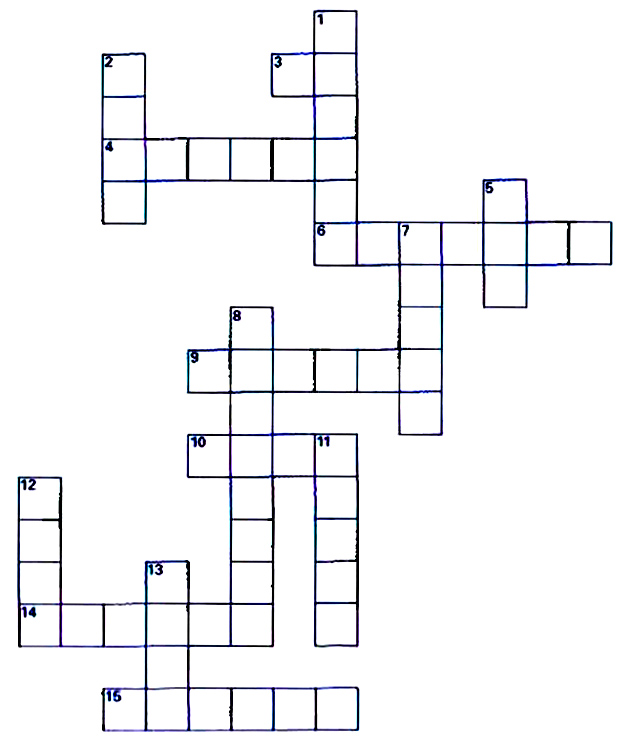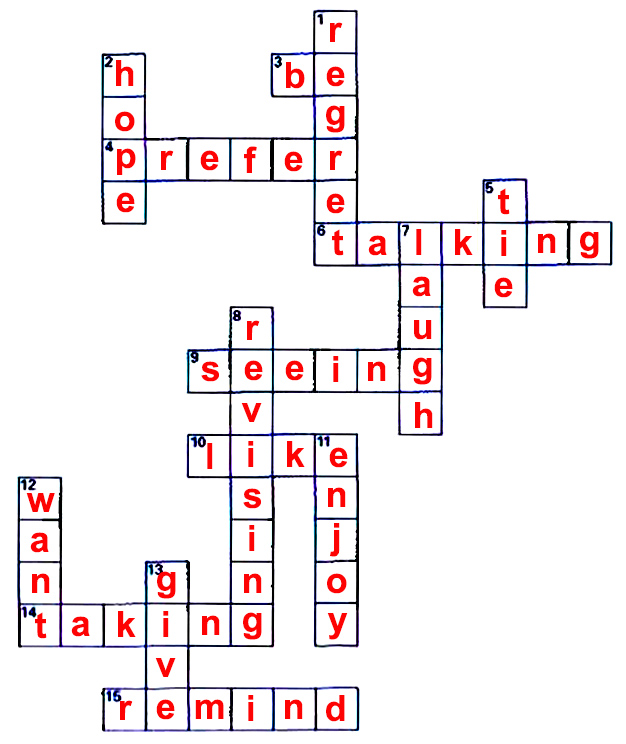Exercise 1
Complete the sentences. Use the correct form of the verbs in brackets.
a You won’t believe this! Jimmy wants me ……………….…… (go) out with him!
b Carla says she’d prefer ……………….…… (stay) in than go out tonight.
c Mike loves ……………….…… (chat) to new people.
d Are you interested in ……………….…… (play) tennis with me sometime?
e Sally denied ……………….…… (eat) the sweets even though it was obvious she had.
f Will you let us ……………….…… (watch) TV if we do our homework?
g My grandfather taught us ……………….…… (fish) with rods and nets.
h I regret ……………….…… (say) that I completely forgot your birthday. I won’t next year.
i I’m sorry but I don’t remember ……………….…… (meet) you before.
j What do you hope ……………….…… (be) when you grow up?
Exercise 2
Find and correct the mistakes.
a I suggested to have a picnic at the weekend.
b She made me to do all the washing-up and make the beds!
c Tony always persuades me relaxing.
d I can’t drink coffee without to put three spoonfuls of sugar in it.
e The lecturer let me to hand in my essay late.
f We stopped having lunch because we were hungry.
g So, what do you advise me doing?
h Jill will never forget to lose her son in the shopping centre.
i Please don’t let me for getting to post this letter.
j We all dislike to work here. The pay is terrible.
Exercise 3
Solve the clues to complete the crossword. Use the correct form of the verbs below.
tie regret laugh like revise want talk enjoy
give hope see prefer remind be take
| Across | Down |
|
3 Who wants to … a millionaire? 4 I’d … to pay in cash. 6 Stop … for a second, please! 9 We’re looking forward to … you soon. 10 Would you … to go for a walk? 14 He suggested … the bus. 15 Please … me to pay the gas bill. |
1 I to say that you’re wrong this time. 2 I to see you again one day. 5 She stopped to her shoelaces. 7 Don’t make me! 8 Do you regret not … for the exam? 11 Do the kids playing tennis? 12 Do es Tom to marry Gisella? 13 Jack persuaded his boss to … him a pay rise. |

Answers
Read the note to find out why.
1
a to go -> F
b to stay -> C
c chatting -> B
d playing -> A
e eating -> B
f watch -> G
g to fish -> F
h to say -> D
i meeting -> E
j to be -> C
2
a to have having -> B
b to do do -> G
c relaxing to relax -> F
d to put putting -> A
e to hand in hand in -> G
f having to have -> D
g doing to do -> F
h to lose losing -> E
i forgetting forget -> G
j to work working -> B
3

Notes
A
Use the -ing form (not the infinitive) after a preposition, e.g. in, without.
B
Use the -ing form (not the infinitive) after some verbs, e.g. deny, dislike, love, suggest.
C
Some verbs are followed by the infinitive (not the -ing form), e.g. hope, would prefer.
D
Use the infinitive after regret when it means that you are sorry about something you’re going to say. Use the infinitive after stop when it means that you stop doing one thing in order to do another thing.
E
Use the -ing form after remember and forget when you’re talking about a memory.
F
Some verbs are followed by object + infinitive, e.g. advise, persuade, teach, want.
G
Use object + base form of the verb after let and make.
Review
Verb patterns
Using the -ing form
– You use the -ing form (not the infinitive) after a preposition, e.g. about, at, in, like, of, without, etc.
We’re really looking forward to seeing you. Is Charlie interested in music?
– You use the -ing form (not the infinitive) after some verbs, e.g. can’t bear, can’t stand, dislike, don’t mind, enjoy, finish, go, hate, like, love, mean, suggest, etc.
It means getting up really early but at least the flight is cheap.
The verb go is very common when you’re talking about sports.
I suggested going to Majorca. Let’s go jogging/swimming/cycling.
Using the infinitive
– You use the infinitive (not the -ing form) after some verbs, e.g. agree, decide, hope, learn, manage, need, promise, want, would like/love/hate/prefer, etc.
She promised not to eat the sweets. He’d prefer to pay cash if that’s OK.
Verbs that take both the -ing form and infinitive
– You use the -ing form or the infinitive after some verbs, e.g. forget, regret, remember, stop, try. Be careful! The meaning of the verb changes.
stop
Sheila stopped to say hello. (She stopped what she was doing. She said ‘Hello’.)
Mary stopped saying she was hungry. (She kept saying she was hungry. Then she stopped.)
forget
I forgot to lock the car. (It’s unlocked.)
I’ll never forget meeting you for the first time. (It’s an important memory.)
remember
Do you remember meeting me for the first time? (Is it a memory you have?)
Did you remember to lock the car? (Sometimes you forget.)
regret
I regret shouting at the dog. (I shouted. I’m sorry that I did.)
I regret to say you’re fired. (I’m going to tell you you’re fired. I’m sorry about it.)
Object + infinitive
– You can put the object + infinitive after some verbs, e.g. advise, allow, encourage, help, order, persuade, prefer, remind, teach, want, etc.
We encouraged the children to learn French as well as Italian.
